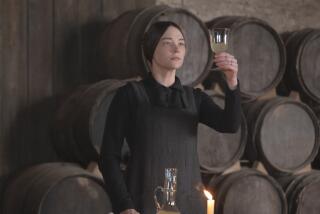Review: Bertrand Tavernier’s ‘Journeys Through French Cinema’ is one you won’t want to end
- Share via
Though it would be enthralling and irresistible at any moment in time, Bertrand Tavernier’s “Journeys Through French Cinema” is especially satisfying right now.
With movie theaters closed, what could be better use of at-home time than watching an eight-hour documentary series streaming on Amazon Prime’s Cohen Media Channel detailing the glories of French film culture, a cinematic history that is fully as rich as our own.
But, more than that, by giving us glimpses of this cornucopian wealth of movie narrative, “Journeys” reminds us what we are missing, why theatrical films continue to matter no matter how dire things become in the wider world.
Filmgoers with sharp memories will think immediately of Tavernier’s previous documentary, 2016’s similarly titled, 3 1/2-hour “My Journey Through French Cinema,” which was released in theaters.
Both endeavors start with the same opening montage of unforgettable moments in French film, scenes like Jeanne Moreau in “Elevator to the Gallows,” Simone Signoret in “Casque d’Or” and Michel Simon in “Panique.”
And both also follow the same format, starting with expertly selected clips (Tavernier knows what the most arresting images are), items like a gorgeous glimpse of newly restored footage from 1936’s “La Terre qui meurt,” perhaps France’s first color film.
And then there are the informative interviews, often vintage ones from French television, but also mixing in savvy contemporary directors like Olivier Assayas, who makes the connection between dialogue-heavy golden age French director Sacha Guitry and Quentin Tarantino because, for both of them, “language moves the plot forward.”
And, of course, there is Tavernier himself, the most intelligent and formidably articulate of enthusiasts, passing on his knowledge and unexpected insights about the great passion of his life.
Who else but Tavernier, for instance, would notice that the soundtrack to 1952’s Jean Gabin-starring “The Truth About Bébé Donge,” presages Philip Glass.
But because the French cinematic world is so vast, and Tavernier’s knowledge of all its aspects so encyclopedic, there is no overlap between these two projects. Consider this a deeper dive, a chance to examine what didn’t fit the first time around and enjoy all the fascinating information these hours are crammed with.
The series’ first two parts examine the directors Tavernier calls “my bedside filmmakers,” lifelong companions “in good times and bad, to whom one returns to warm the heart.”
These include the great Max Ophuls, who moved the camera “as if life depended on it” and the underrated World War II era humanist Jean Grémillon.
This section also includes an examination of the parallels between two directors only Tavernier would couple, the playful Jacques Tati and the somber Robert Bresson.
The series’ third hour is devoted to one of Tavernier’s special passions, the use of music in film, and focuses on Julien Duvivier, a director who could be difficult but excelled in songwriting and the use of sound.
Episode 4 focuses on the work of French filmmakers under the German occupation, a subject that Tavernier knows especially well because of directing 2002’s “Laissez-passer” (Safe Conduct), a historical drama set during that era.
Following that, Tavernier devotes an hour to postwar French cinema, including three directors — Claude Autant-Lara, Réne Clément and Henri-Georges Clouzot — whom Tavernier feels were each in his own way precursors the New Wave.
Part 6, poetically called “The Forgotten Ones,” brings to light directors whose reputations Tavernier feels were unjustly “erased, eradicated,” followed by Part 7 on “Underrated Directors,” filmmakers whom Tavernier feels pretty much no one knows about.
The most personal episode is the final one, “My 60s,” which details Tavernier’s partnership with the late Pierre Rissient as press attachés who brought France’s attention to Hollywood veterans like Raoul Walsh and John Ford as well as a young director named Clint Eastwood.
Long as it is, “Journeys” is so continually involving we want it never to end. When Tavernier calls it “an exercise in admiration and gratitude,” we can only nod in agreement and express our appreciation to be able to share in its riches.
'Journeys Through French Cinema'
In French with English subtitles
Not rated
Running time: Eight one-hour episodes
Playing: Amazon Prime Cohen Media Channel, $4.99 per month after free trial
More to Read
Only good movies
Get the Indie Focus newsletter, Mark Olsen's weekly guide to the world of cinema.
You may occasionally receive promotional content from the Los Angeles Times.











